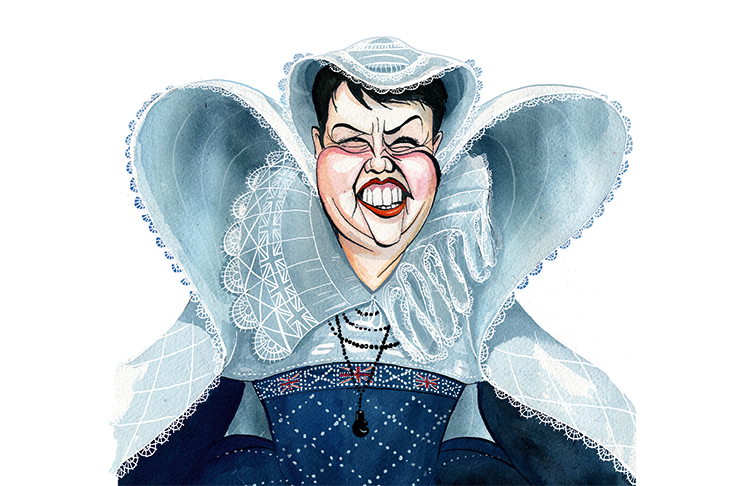‘You wouldn’t make good spies, would you,’ chuckles Ruth Davidson as she finds us sitting with our backs to the door in the Scottish Parliament café. She then triumphantly declares that she knows who we’ve been speaking to when preparing for the interview — getting two out of the five names isn’t bad going. After this, she sets off for her office at a pace that leaves us and her communications director trailing in her wake. She scrolls impatiently through her phone as she waits for us to catch up at every security door.
Davidson is as direct as she is energetic. When the editor begins by pointing out the state of the Tories when he left Scotland 15 years ago, Davidson cracks back, ‘Did you leave your accent behind?’ This is her style: in your face and eager to throw you off balance. She has certainly thrown Scottish politics off balance. From years of being an irrelevance, she has made the Scottish Tories the official opposition at Holyrood. As one UK Cabinet member puts it: ‘I never thought I’d live to see the day where England only has a Tory government due to gains in Scotland.’ This is the brightest spot in a year of disappointment for the Tories, and why she is fast becoming the party’s new darling.
Now it’s England’s turn to wonder how a hollowed-out Tory party can survive. Davidson is seen as having done a Lazarus on the Scottish Conservatives. What was her secret? She acknowledges that the independence referendum was key, allowing, as it did, the Tories to play the Union card. But her main tactic, she says, was to stop apologising. ‘The party did go round saying “I’m sorry I’m a Conservative but…” and my argument was that we had to completely change the way in which we held ourselves. And start saying: “I believe in X and if you believe in X then you’re a Conservative, too.” That change of mindset gives people confidence, it gives your message-carriers confidence at the door, it means that people who used to be called the shy Tories in Scotland are no longer shy.’
Then there is that other crucial ingredient: leadership. Or, as Davidson puts it, ‘Your message is only as effective as your message-carriers.’ So Davidson sought out people from outside politics to become Scottish Tory candidates. She is, though, keen to emphasise that she didn’t do a David Cameron-style A-list, and didn’t select anyone just because they belonged to minority groups. ‘I said: the only way you get on the candidates list is to be really effing good.’
So what’s going wrong with the Tories in England? She says she doesn’t want to ‘rake over the coals’ of the last election — before doing just that. ‘In six years, I’ve led the Scottish party through six national election campaigns and two referenda,’ she says. ‘I’ve got a bit of experience in campaigning. Part of the issue is a belief that you can say the same thing every day for seven weeks and the media will just report that.’ A dig, perhaps, at Sir Lynton Crosby’s strong-and-stable message. Also, she says, people felt they were taken for granted. ‘Voters don’t like results being declared before they have cast their votes, thanks very much. There was a bit of a backlash there. Corbyn was seen as a safe receptacle because everybody had written off his chances. Well, he won’t be a safe receptacle next time.’
The Corbyn mania, she says, is a phenomenon that she’s seen — and dealt with — before, in the months after the Scottish independence referendum where the SNP went from six to 56 seats in Scotland. ‘We saw Nicola Sturgeon doing political rallies to 10,500 people at the Glasgow Hydro, release a signature clothing range, sell foam fingers with her name on. We had seen this kind of momentum build behind a seemingly unstoppable force before — then two years later, she went and lost 40 per cent because we dug in. You don’t run, you just keep restating your case. And I don’t believe that Jeremy Corbyn is unstoppable. I think he’s eminently beatable in 2022. People who are so afraid of him do need to get their act together and start making that case now.’
And what about the current Tory leader? For the only time in the interview, Davidson stops talking fast and starts picking her words very carefully, obviously keen not to say anything that could be hurtful. ‘Nobody wants to take such a big call and to see it not work out the way that they wanted to,’ she says. ‘I have always found her warm and self-deprecating. When she’s comfortable with somebody, she can be good company.’
Davidson and Theresa May had a shared success this year in beating back Nicola Sturgeon’s demand for a second independence referendum. Davidson explains that the Tories had plenty of time to prepare because Sturgeon signalled her intention to call another vote straight after the Brexit referendum. Might the SNP’s mistake have been to have spoken as if all of Scotland was against Brexit, when in fact two in five Scots voted for it — in the near-total absence of high-profile Scottish advocates of Brexit? ‘Does Gove still count himself as Scottish? I don’t know,’ she laughs. ‘The single biggest party political voting group for Brexit were SNP voters, anything up to a third of its supporters. They really have been written out of the SNP’s narrative, it’s quite something to see.’ The SNP lost Moray, she points out, a north-eastern constituency that had a big Brexit vote.
Davidson is a naturally combative politician and comes most alive when there is a bit of needle. So: can she imagine herself trying to duck out of a debate the way that Theresa May did at the election? ‘Well, if you believe in something you should be prepared to fight for it. I have always been prepared to fight for the stuff that I believe in.’ She leaves the comparison hanging. She credits her combative nature to ‘growing up in newsrooms’ as a BBC journalist. ‘You learn that you can stake out your ground, you can make your point. If you lose, that’s grand, but you’ve made your point anyway. And you did it forcefully.’
It is this pugnacious quality and fearlessness that make so many Tories south of the border dream of her taking on a bigger role. They see her as the person most likely to be able to prove that Corbyn really is ‘eminently beatable’. So far, Davidson has taken care to dodge the question — but now, we’re beginning to see an answer. Many in Tory HQ seek her organisational magic, and word is that they have been trying (without success) to have her team run next year’s local elections in London (where the Tories expect obliteration). What about making her party chairman? For the first time, she rules it out. ‘I couldn’t give my whole self to leading the party in Scotland and doing that job as well,’ she says. ‘Leading the party in Scotland is a bigger job than being Conservative party chairman.’
She thinks she can become First Minister of Scotland; if so, a move to Westminster is off the cards. But given that Labour’s recent revival in Scotland means that the Tories are sometimes coming third in the polls, it’s unlikely. So what then? She freely admits that in that case she would consider her options. ‘I’ve been leader of the party now for six years. My two predecessors lasted six and a half years each,’ she says, so she’ll end up having served ‘significantly longer than them. And then we can start other conversations.’ Conversations about her coming to Westminster? ‘I haven’t ruled it out. If devolution is going to work, then actually there has to be the ability to move between chambers and parliaments.’
Might this explain why she has been visiting so many English seats recently? She was a guest at Nicholas Soames’s constituency recently, and is giving a Burns Supper address in Putney next year. But this, she says, was just her being helpful. ‘When we didn’t have any MPs in Scotland, colleagues from down south would come up and do things for our local associations. So I’m kind of paying my dues in terms of paying back the people who came to help me over the years. And nobody ever noticed before, but I’ve always done it — over the last seven years.’ So would she only ever stand for a Scottish seat? ‘Yes.’
Suddenly, the prospect of Davidson standing in the 2022 general election seems very real: she has now outlined her roadmap to Westminster. Combine this with her ever-rising UK-wide profile and her presence on the Tory rubber chicken circuit, and it is easy to see why so many think she is preparing a leadership bid.
She’s now preparing to drive over to Ireland for Christmas with her fiancée, Jen Wilson. ‘We do Christmas year about: we did a Scottish Christmas last year and an Irish one this year. So we stay with her brother and her family: nieces, nephews, sisters and brother-in-law, there’ll be about 19 of us in the house. It’ll be madness!’ She seems delighted at the prospect. When we ask about how she keeps her energy levels up, she points to a can of Diet Coke on the table. ‘My mother keeps sending me cuts from newspapers saying it is going to ruin my fertility, give me osteoporosis,’ she says. But she has (at least) four cans a day.
Davidson always likes to say that defending the Union is her most important job, that is why she irritated No. 10 by declaring her opposition to any special Brexit status for Northern Ireland. But surely one contribution to saving the Union would be another Scottish Prime Minister? we ask. Davidson, slightly irritably, replies that, ‘The best people for the job should assume the job.’ She then lists the attributes that these people would need to have, other than being a Conservative and Unionist: ‘The best leadership qualities, the best vision for the country, the grit, the determination to see it through, and the resilience to take the knocks that come with it.’ It is, surely, not a coincidence that these are precisely the qualities that Davidson’s admirers say she has in spades.
Got something to add? Join the discussion and comment below.
Get 10 issues for just $10
Subscribe to The Spectator Australia today for the next 10 magazine issues, plus full online access, for just $10.
You might disagree with half of it, but you’ll enjoy reading all of it. Try your first month for free, then just $2 a week for the remainder of your first year.














Comments
Don't miss out
Join the conversation with other Spectator Australia readers. Subscribe to leave a comment.
SUBSCRIBEAlready a subscriber? Log in